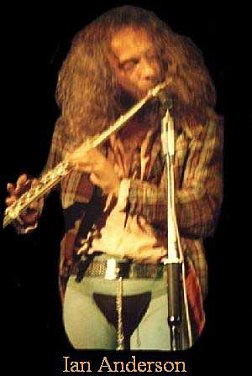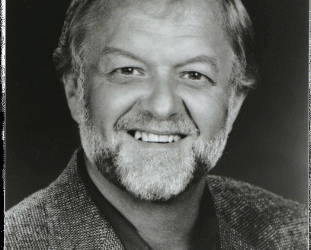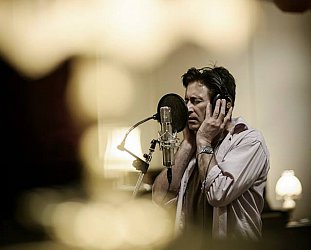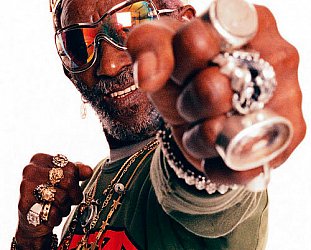Graham Reid | | 3 min read

Rock journalists in this country need little reminding that we live a long way from the action. But the reminders come every time a record company or promoter says that deathless phrase, "We've got you a phoner".
The phone interview has largely killed any last flicker of spontaneity that rock might have had left. These are set pieces of carefully controlled theatre in which the actors all know their parts and the lines are seldom fluffed.
It happens like this: at a pre-arranged time you sit in your office and the Famous Person sits in theirs and you talk for maybe 20 minutes. At least that's how it was a few years ago, these days you are often given a time limit of 15 minutes, and it's damn hard to wrestle any new or even interesting information or opinion out of a Famous Person who is doing sometimes a day of these back-to-back.
The best you can hope for is you are either first when the Famous Person is moderately fresh, or last when -- if you are both interesting enough -- you can run over your allocated time. You get to do this by sympathising with the Famous Person, asking what the dumbest question they have heard that day was, and having a grab-bag of oddball questions you may just pique their interest with.
These phoners aren't all irredeemably bad: I've had what I consider fine conversations with Miles Davis (see Inner Visions) and people interviewed-out artists like Kris Kristofferson, Branford Marsalis, David Bowie and Elvis Costello.
I've also had a surly Neil Young (see the recollection of that one elsewhere on My Back Pages), people who were so on autopilot they referring to their notes about album tracks, the occasional interruption by a manager or minder who insists the Famous Person not answer that question (Hey, if you are listening in why wasn't I told?), and then just the usual blather of platitudes and irrational nonsense.
Sometimes it's fun: I've had Rita Marley tell me to hold on while she gets a goat out of the kitchen, Jimmy Webb play piano down the line to me, and the odd person sing a little bit just to get a point across.
I've also had my suspicions that the Member Of The Famous Rap Outfit might not actually be the person I was told they were.
And twice I have been utterly bored witless and at great length by two crashing dullards whose music I never really much liked anyway: Jethro Tull's Ian Anderson and Scottish-born singer-songwriter Al (Year of the Cat) Stewart.
I will never forget the pleasant night in 93 when, just before Tull came to play a gig in New Plymouth organised by Shagger of the Magogs biker club, I sat on my couch with the tape plugged into the phone and had to listen to about 45 non-stop minutes of lecture from Anderson about his particular genius, how he is always thoroughly engaged by his own songs despite singing them hundreds of times (Does anyone believe that particular slice of bullshit?), how the demand for Tull re-issues and live albums meant they had to keep turning out product, and how they had "an esoteric fan base".
At that point I just wanted to say, Does that mean sad old bastards with more money than sense?
But I couldn't get a word in. On and on he blathered. He told me the band got "boringly good reviews these days".
He didn't much like it when I interrupted his spew of words and asked why, if they were so great, did the rock history books either marginalise or disparage them. It seemed a fair question.
My tea went cold and then warmed up again as the Ice Age passed between when we introduced ourselves and I eventually excused myself. The worst part about a lengthy and dull interview like this is you feel obliged to go back into and transcribe the less tedious bits. That takes even more time.
Never again, Mr Anderson.
A measure of self-importance is essential in the music business, a tractorload makes you sound a complete arse.
Al Stewart was better only inasmuch as he prattled on about marginally more interesting stuff: the agrarian reforms and the post-Industrial Revolution Britain, something about various kings and queens of that sceptred isle and so forth.
He was history buff and I was going to hear all about it. In his rounded well-modulated tones.
I wrote him up as I found him, a thumping bore who banged on and on and on . . .
He actually said, and the quote is right there in print, that he was interested in everything "from Sumeria onwards. Some people are taken by pre-Sumerian cultures, but I'm not. But the past 6000 years fascinates me".
He quoted Shakespeare, spoke about Gorbachev, Sartre, Mervyn Peake and Marshall McLuhan, said he felt we might have to fight the Crusades again ("they weren't too much fun the first time around -- I doubt they'll be any more fun with nuclear weapons" ), and that he "was usually three years too early" with his albums. He said his song which poked at lawyers was continuing with a theme that Tyler started in 1381.
Interesting, but endless.
But I made the terrible error of misquoting the title of his new and astonishingly dull album. (I called it Turn of the Century, it was The Last Days of the Century. Either way I traded it in within days).
But this error was all the proof his legion of New Zealand fans needed -- all eight of them -- that I was a lower form of life and hadn't treated their man with the respect he deserved. There was a letter of complaint from Tauranga accusing me of creative journalism , suggesting I never even spoke with Stewart (I didn't actually, I just listened), and had not listened to the album.
My excuse for the awful error (true as it happened) is that I was rushing to compete the story on a tight deadline before I went on sick leave.
Something Al said maybe?







Ralph connor - Oct 3, 2015
Yeah, but isn't Year of the Cat wonderful. GRAHAM REID: Agreed, and quite a number of other songs in his vast catalogue. A case of the songs not the singer-in-conversation
Savepost a comment